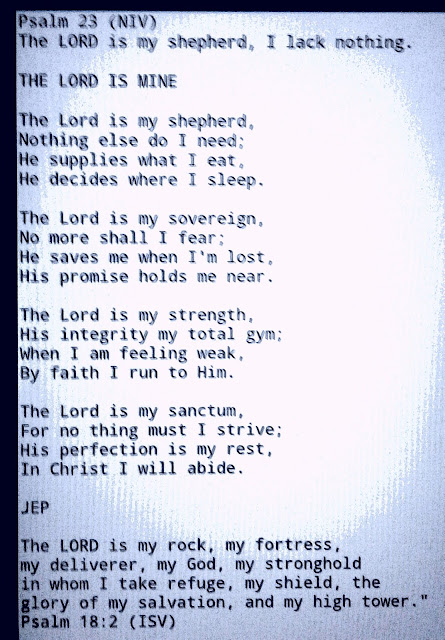SURRENDER TO LOVE
On this long journey of love and nerve,
Bound by the cross to follow Jesus Christ,
Choose every day whom you will serve,
Just don't be surprised if you lose your life.
The more you love the more you will grieve,
There is no escaping the onset of death;
But as we surrender our hearts to holy love,
God's providential promise is our strength.
Surrender to Love - Lift holy hands to Heaven,
Release ALL the stuff that binds you to Earth;
Press on by FAITH through all of life's storms,
For @ the journey's end is an eternal treasure.
Life Lives On in the Freedom of Forever Love!
| | | 
In the message "Shiny Stones" we saw how we are often trapped by the seductive temptations of the world and kept from a truly free life - a life found only through complete surrender to Jesus; "Whoever finds his life will lose it, and whoever loses his life for My sake will find it" (Matthew 10:39). This may seem a little radical - maybe only something for those "really serious" Christians - but God's Word clearly sets this as the standard for all His children.
Matthew 10:38
"Anyone who does not take his cross and follow Me is not worthy of Me."
Luke records similar words as Jesus spoke to a large crowd: "and anyone who does not carry his cross and follow Me cannot be My disciple" (Luke 14:27). Jesus also said that anyone who would come after Him must "take up his cross daily and follow" (Luke 9:23).
But what does it mean to take up our cross? I've heard people refer to a hardship or difficult situation as "my cross to bear," but God's Word contains no such reference. The cross has only one Biblical association: Death! The only time anyone would carry their cross was when they were about to die.
Yes, we are called to die. But the call is not to a physical death - this death will eventually come to us all, and there's never a need to hasten its arrival. The call of Jesus is to a death of "self," the old sinful nature with its evil desires, dreams, and ambitions: "I have been crucified with Christ and I no longer live, but Christ lives in me. The life I live in this body, I live by faith in the Son of God" (Galatians 2:20).
We are called to a death which leads to true contentment and peace. But this death is not a one time event; we are called to die daily! And this death is never easy. Don't be surprised when every day seems to breath life into our old nature - when we begin to talk, act, and think contrary to the way of Christ. When this occurs, simply praise God for the conviction of His Spirit, take up the cross once again, and continue to follow down His path.
As we "die" and completely surrender control to God, temptations of the world lose their pull and anxieties lose their source of concern. As we no longer live, we no longer focus on the cravings of our flesh nor about what tomorrow may or may not bring. As Christ lives in us, the enemy loses their ability to effectively attack - they are no longer attacking us but Christ...and He always wins!
Our call is to become a follower of Jesus Christ and be transformed into His image. But to follow we must die! Let's become His worthy disciple as we love Him and trust Him with all our heart. Let's set aside all that is not directed by God and take up our cross.
Have a Christ Centered Day!
Steve Troxel
God's Daily Word Ministries |
|  Find us on Facebook Find us on Facebook  Mail from GDWM is only sent to those who subscribe (free of cost) or
by invitation from friends. Please unsubscribe if these messages are
no longer desired. We absolutely do not support unsolicited E-mail.
Scripture references: The Holy Bible: New International Version.
Copyright 1973, 1978, 1984 by International Bible Society.
***************************************************** |
| | |
|
























Comments
Post a Comment